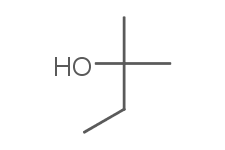
Dimethylethylcarbinol
CAS No. 75-85-4
Dimethylethylcarbinol( —— )
Catalog No. M19505 CAS No. 75-85-4
A branched pentanol used primarily as a pharmaceutical or pigment solvent.
Purity : >98% (HPLC)
 COA
COA
 Datasheet
Datasheet
 HNMR
HNMR
 HPLC
HPLC
 MSDS
MSDS
 Handing Instructions
Handing Instructions
| Size | Price / USD | Stock | Quantity |
| 100MG | Get Quote | Get Quote |


|
| 200MG | Get Quote | Get Quote |


|
| 500MG | Get Quote | Get Quote |


|
| 1G | Get Quote | Get Quote |


|
Biological Information
-
Product NameDimethylethylcarbinol
-
NoteResearch use only, not for human use.
-
Brief DescriptionA branched pentanol used primarily as a pharmaceutical or pigment solvent.
-
DescriptionA branched pentanol used primarily as a pharmaceutical or pigment solvent. It remains liquid at room temperature making it a useful alternative to tert-butyl alcohol. It is a colorless liquid with a pungent odor of camphor which is miscibile with both water and organic solvents.
-
In Vitro——
-
In Vivo——
-
Synonyms——
-
PathwayOthers
-
TargetOther Targets
-
RecptorOthers
-
Research Area——
-
Indication——
Chemical Information
-
CAS Number75-85-4
-
Formula Weight88.15
-
Molecular FormulaC5H12O
-
Purity>98% (HPLC)
-
SolubilityDMSO:>10 mM
-
SMILESCCC(C)(C)O
-
Chemical Name——
Shipping & Storage Information
-
Storage(-20℃)
-
ShippingWith Ice Pack
-
Stability≥ 2 years
Reference
1.Anand JS et al. Forensic Sci Int. 2014 Sep;242:e31-3.
molnova catalog



related products
-
3-Hydroxybenzoic aci...
Produced in the gut microflora as one of the three main metabolites formed from the catechin diet. Its use in the production of glycol benzoates for the application of plasticizer in adhesive formulations is increasing.
-
Phenoxyacetone
Phenoxyacetone is an inhibitor of acetylcholinesterase.
-
Cordifolioside A
Cordifolioside A possesses immunomodulatory activity, it has a potential in vivo radioprotective effect as well as in vitro cytoprotective activity.



 Cart
Cart
 sales@molnova.com
sales@molnova.com


